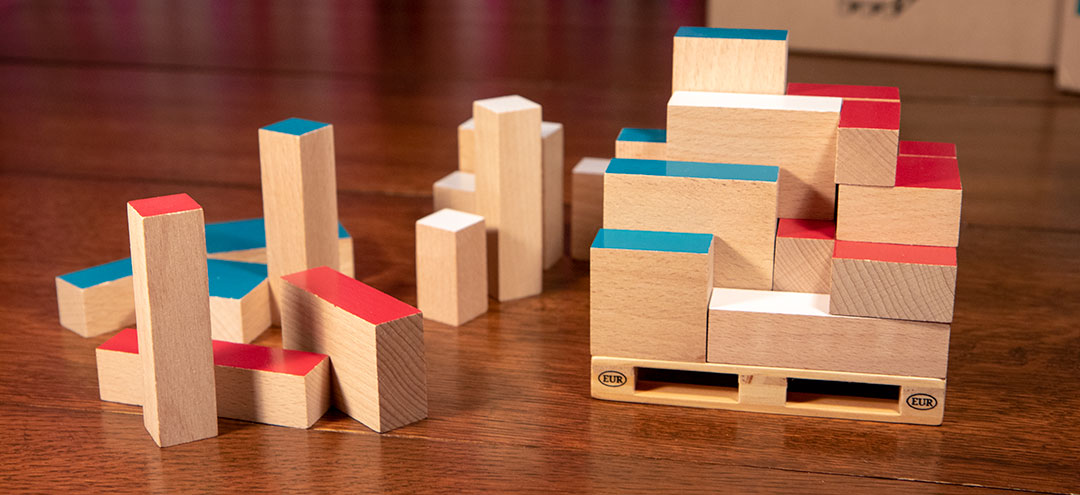 If you’ve never stacked a pallet before, there is something immensely satisfying about having it be a perfect, uniform shape. Having no boxes jutting out or gaps showing is a thing of beauty.
If you’ve never stacked a pallet before, there is something immensely satisfying about having it be a perfect, uniform shape. Having no boxes jutting out or gaps showing is a thing of beauty.
For those of you that have never worked around pallets but always dreamed of stacking one (do those people exist?), you’re in luck. Today we are going to look at Team Up!, a stacking game published by Helvetiq.
Team Up! is a cooperative stacking game for 1-4 players that takes about 15 minutes to play. Team Up plays best as a solo game.
Gameplay Overview:

The goal in Team Up is to stack the boxes on the pallet as evenly and efficiently as possible. On a player’s turn, they draw one card from the deck which tells them which box to stack. There are three sets of boxes (red, blue, and white) in a variety of rectangular shapes. A card will tell the player to stack either a specific color, or a shape of any color.
The stacking rules are pretty simple. No overhangs, the color side must always be face up, and identical boxes cannot 100% share a side (offset is ok).
If a player can’t stack the box without violating the above rules, the card is turned face down.
The game ends when the last box is placed, the draw deck is empty, or the players decide to end the game. Players earn 5 points per fully competed level of the stack, and lose a point for each facedown card and box not used.

Game Experience:
Outside of a select few, pretty much the only stacking games I have played have been of the dexterity genre, so it’s nice to see some come out with a different take. Stacking in Team Up will definitely challenge your spatial awareness and planning. The rules are simple, but trying to get the max score (25 points) will challenge both your luck and your planning.
Overall, I thought that Team Up is one of the more enjoyable of publisher Helvetiq’s easy to learn games. The rules are simple, the gameplay is quick, and it works well as an abstract game. It also offers some nice replay value if you are a score chaser as I’ve never even come close to a perfect score (15 is my record so far).

That being said, while this game can be played cooperatively, it’s really not very fun with multiple players. You are all doing the exact same thing and more players doesn’t really add any value to the game. In fact, if you have anyone that’s especially good at these kinds of puzzles, there is a real risk of them taking over the game with “suggestions”. So despite being call Team Up, this is really a solo game. They probably should have just called it Stack Up.
The only other knock against Team Up is something that seems to plague most Helvetiq games. The rulebook isn’t great. For example, the rules don’t say anything about what to do if you draw a card and you have no more boxes of that type. The rulebook is small, and in multiple languages, but could definitely have used a bit more TLC.
Final Thoughts:
If you are looking for a puzzly solo game, Team Up can fit the bill. The game play is fairly unique and requires minimal setup time. If you are the kind of person that will push themselves to keep getting a higher score, than you can have a good amount of fun with Team Up. That being said, if you are in the market for another great cooperative game to play with your gaming group, you can safely give this one pass.
Final Score: 3 Stars – A solid solo experience that plays quickly and provides a nice puzzle to solve.
 Hits:
Hits:
• Cool pallet component
• Easy to learn rules
• Works great as a solo game
Misses:
• Cooperative play isn’t very fun
• Rulebook could be clearer























